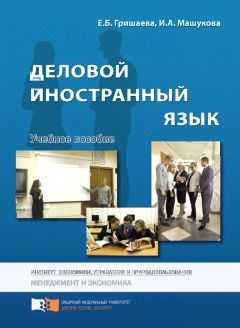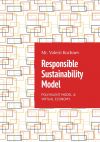Текст книги "Деловой иностранный язык"

Автор книги: Ирина Машукова
Жанр: Учебная литература, Детские книги
сообщить о неприемлемом содержимом
Текущая страница: 2 (всего у книги 15 страниц) [доступный отрывок для чтения: 4 страниц]
1. When the directors are discussing the problems facing the company they primarily have to consider
a) the interests of the public.
b) their own interests.
c) the interests of the shareholders.
2. When a proposal is made and a vote taken the usual arrangement is that
a) each director has one vote no matter how many shares he hold.
b) only the chairperson can vote.
c) the directors with most shares have the most votes.
3. Key members of staff will be chosen by the managing director because
a) he is more knowledgeable than the other directors.
b) he has got to answer to the board for their performance.
c) he earns more than the other directors.
4. Non-executive directors will often be appointed because
a) they have valuable contacts with potential customers.
b) they have departmental responsibilities.
c) no-one else is available.
5. Directors are usually required to have shares in the company so they can
a) be seen top have a personal stake in the business and thus be affected by their decision.
b) receive share certificates from the registrar's department.
c) take on administrative duties.
6. Strategic decisions are concerned with
a) the details of day-to-day Administration.
b) the disposition of the company's resources.
c) the payment of wages.
7. While decision-making powers are commonly delegated to senior executives
a) the directors are not responsible to the shareholders for any mistakes which might be made
b) they are not responsible for any errors of judgement.
c) the directors remain responsible to the shareholders for any mistakes which might be made.
8. The further ahead one plans
a) the more troubles there are likely to be.
b) the more one can anticipate problems and thus avoid them.
c) the less one can anticipate problems.
9. Tactical decisions are those by means of which the senior executives
a) carry out their own plans.
b) destroy the opposition.
c) carry out the plans prescribed by the board of directors.
10. The directors have to initiate long range plans with a view to ensuring
a) the achievement of the company's objectives.
b) the maintenance of good relations with the senior executives.
c) compliance with the law.
Task 7. Talking Point 3
Study the information about a situation in Rumford Engineering. It is a public limited company and its shares are quoted on the London Stock Exchange. The chart below shows the lines of communication and command between the company's senior officials.

Figure 1.
After studying a chart, discuss the following questions with your partner:
1. From whom do the Line Managers and the Chief Engineer take orders?
2. If the Managing Director and the Production Manager had a meeting, what do you think they might discuss?
3. How many executive directors are there in Romford Engineering?
4. If the Computing Manager was sending information to the Managing Director should he send it through the Financial Director? Why?
5. How many immediate subordinates do each of the Departmental heads have?
6. In what circumstances do you think the Marketing Director and the Production manager might have conflicting interests?
7. Would you expect the Chief Engineer to be paid more or less than the Production Manager? Why?
8. What sort of work would you expect the Wages Officer to do?
9. If there was a dispute between one of the line managers and the Chief Engineer, how would you expect it to be settled?
10. If there was a dispute between the Marketing Director and the Financial Director how would you expect it to be settled?
Task 8. Vocabulary 3
Fill in the blanks with appropriate words from the list below:
Nouns: accounts, board, responsibilities, directors, votes, shareholders, resolution, team.
Verbs: make, propose, elected, answers, passed, ensure, undertake, send.
1. The ________ of a company have the responsibility to ________ that the requirements are complied with.
2. The directors of a company must ________ a copy of the company's annual ________ to the Registrar of Companies.
3. The directors will ________ decisions by passing resolutions at the ________ meeting.
4. Each of the directors will normally have one vote when a ________ is ________.
5. Resolutions are ________when there are a majority of ________ cast in favour.
6. Executive directors are those who ________ departmental ________.
7. The directors are ________ by the ________ at the annual general meeting.
8. The managing director ________ to the board for the performance of his management ________.
Task 9. Reading 3
Getting started
▪ Before reading the text, discuss in small groups why planning is significant for successful work of the companies, what types ofplanning you know and what main differences are between these types.
▪ Now read the text, title it and check if your ideas are right. Consult Vocabulary p. 140.
Top management is often under heavy pressure so that immediate problems often absorb much of their efforts. Time to analyse complex data and project future trends is likely to be limited. To combat this problem a long-range planning department might be set up to act in an advisory capacity. The long-term planning team would be directly responsible to the managing director, but freed from routine duties. Such a department would be small and made up of top quality generalists, trained to see the wood as well as the trees.
It is difficult to decide how far ahead to plan. An accurate long-term forecast is most advantageous to the firm, but the further ahead one looks, the less certain one can be of the outcomes. To overcome this problem a flexible approach needs to be adopted. Long-range plans for, say, three to five years might be mapped out, but there will have to be frequent reviews and re-appraisals so that the direction of the firm can be changed as and when the need arises.
Firms may want to enter new industries, launch new products, enter new markets (perhaps overseas) or acquire new subsidiaries. Existing activities may be expanded, consolidated or cut back. Whatever the requirements, careful planning is called for. The production side of the business has to be geared to keep pace with changes in the market. At the same time stocks must be kept at just the right level. If the stock level is too high, capital is tied up unproductively. If the stock level is too low, an upsurge in demand will lead to potential customers being turned away, possibly permanently.
There is also a difficult choice to be made between a policy of diversification and short term profit maximisation. The risk of failure can be reduced by choosing to produce a range of goods and services so that if revenue from any of them contracts it represents only a small part of the whole. A policy of diversification can be equated broadly to an insurance contract, and there is a price to be paid in both cases. In the case of insurance the price is in the form of a premium, and in the case of diversification it is the cost of choosing less profitable but more diversified activities. It is also possible, indeed likely, that the expertise of top management will fall short of encompassing all the diverse skills and detailed knowledge called for in such a wide range of undertakings.
The managing director, like the conductor wielding a baton on his rostrum, has the often unenviable task of orchestrating the diverse activities into a purposeful concerto.
Task 10. Writing 1
Read the text thoroughly again and make a summary (100 words). Consult Writing References, see Appendix I p. 131.
Task 11. Reading 4
Error correction. You are the Personal Assistant to Richard Grieves, the Sales Manager at Fenton Floy Ltd. He has been asked for a brief report on sales for the last quarter by Robert Davidson, the Managing Director. The report was drafted and sent down to the typing pool but it has e-merged with a number of mistakes in it. Richard has asked you to go through it correcting any errors you find. 'There are at least ten obvious errors,' he says, 'and there may be more’.

Sales for the last quarter of 2015 for the first time in six years we have fallen short of our quarterly sales target (by approximately 3 %) and while this was a disappointment to the whole of our team there are some simple explanations for the poor results. I understand you have already been given a detailed breakdown of the sales figures.
Overseas Division
The recent falls in the value of the US dollar have had an adverse effect on our sales in that part of the world. We find ourselves in an extremely competitive market, with a number of domestic companies already undercutting our prices. We have until now managed to retain our 10 % share of the market, but the further decline of the dollar has put new pressure on us.
New Products Division
This is the other area which has produced disappointing results. The explanation here is, as you will know that the Head of the Division recently suffered a heart attack and will not be returning to work. His replacement, Michael Graeme, had to be brought in from outside the company. While I am sure he will soon bring about a recovery, there has been a temporary downturn in sales in this division.
Action being taken
every member of my team has been made aware of the seriousness of the situation and I am glad to say that from the projections in front of me it looks as if our total sales are once again beginning to rise, please let me know if you require any further details.
Richard Grieves
Task 12. Reading 5
Getting started
▪ What do you know about the concept of “decision-making”? Discuss it in small groups.
▪ Think about situations when you are to make a decision and choose between alternatives: what influences your choice.
▪ Now read the text and check your ideas. Consult Vocabulary p. 140– 141.
When we talk about making decisions in business we tend to think of the major decisions which are made from time to time, such as the decision to go ahead with the Eurotunnel Project, or the decision to appoint a new chairman for the National Coal Board. The fact is that a multitude of decisions are being made in business every day. Certainly there are major decisions in process as the boards of directors and chief executives in large public companies decide to enter new markets, spend millions on new plant and machinery or advertising campaigns, and buy new buildings or make take-over bids against their most threatening competitors. Yet, for every one of these monumental decisions there area hundred thousand decisions made by more ordinary mortals.
In fact, man is a decision-making animal. He is continuously making decisions every moment of his life. Many of us wake in the morning to the sound of an alarm clock. Here is our first decision of the day. Should we turn off the alarm and go back to sleep? Or should we turn off the alarm and get up? There is even a possible compromise. We can turn off the alarm and stay half awake for another few minutes.
We come down to breakfast and face another decision. Do we have toast or cereals? One or two slices? And what about something to drink? Fruit juice or tea? Coffee? Black or white?
Breakfast over we move on to the next bout of decision– making. What shall we wear today? The black shoes or the brown? Shall we take a raincoat or an umbrella? Shall we go by bus or tube? The decisions we are obliged to make are endless, and interestingly, all the decisions we make, to the extent that we are logical in our approach, are dealt with in precisely the same way.
We are confronted with a problem. We then look for the alternative solutions to the problem, weigh up the advantages and disadvantages of each and select the one which gives us most pleasure and least pain. In business terms we are looking for the options which allow us either to achieve our objectives at the lowest possible cost, or allow us to emerge with the greatest profit.
Take the case of the Eurotunnel. As Britain is now a member of the European Community, her trade with Europe is growing. Unlike the other members of the Community we are an island, separated by an inconvenient expanse of water. Do we build a bridge? Or a tunnel? What would be the advantages of a bridge? And the disadvantages? What sorts of tunnels are available? What would be the benefits of a road tunnel as compared to a train tunnel? How much would each of the alternatives cost? And how much would they cost to maintain? How much traffic could they take? How much revenue could they be expected to earn? And who would provide the funds? These were the questions which needed to be answered by the French and British governments and their respective entrepreneurs before any decisions could be made.
These are, of course, monumental decisions, but the basic principle is the same: the advantages and disadvantages of the various possible alternatives are weighed up and an option is chosen. That is how all our decisions are made.
Task 13. Talking Point 4 – Brain storming
▪ Consider three careers which might be available to you. Make a short list of the potential merits and demerits of each and then decide (and indicate) which of the careers you would prefer.
▪ Make a list of the likely merits and demerits of the Eurotunnel and then decide (and indicate) whether you think Britain do benefit from this venture.
▪ Consider where you will take your next holiday. Make a short list of the options and write under each the merits and demerits of each of the proposals. In the light of your analysis where do you think you will be taking your next holiday? Consult Speaking References p. 126–130.
While preparing, make up a table where you put down all the pros and cons.
Table 1
Available Careers: pros and cons

Task 14. Vocabulary 4
Read the passage filling in the blanks, using words from the list below:

DECISION-MAKING
The problems confronting a manager are likely to be and varied and it is not suggested they can always be ________ by reference to a rigid formula, but an analytical and ________ approach is certainly to be commended. Whether the decision ________ to personnel, finance or marketing, the ________of the process are the same.
First, the ________ must be defined. Where it is________ it may be necessary to break it down into parts. All the relevant facts should be and the various aspects of the situation brought together. Then the full ________of alternatives (or options) should be considered. A choice will have to be made between the alternatives and this ________ weighting up the pros and cons of each of the alternatives, before deciding on what ________ to be the best solution in the given circumstances. What is best in the ________ may not be so appropriate in the long-term – and vice versa.
In a business ________ the decisions will be made in terms of a ________ evaluation. The best alternative will either be the option which gives the greatest profitability, or the one which allows a given goal to be achieved with the ________expenditure.
At this ________ the decision is still in the mind and it now requires implementation. Subordinates need to be told what is ________ of them and their ________ need to be monitored to make sure they are ________ with the instructions.
Subordinates are often given the ________ to participate in the phases of the routine. They can information and usefully discuss a situation with their manager.
However, the ________ between the alternatives is the manager's prerogative, since he ________ responsible for outcome.
Task 15. Writing 2
Study the information given below about Juniper LTD and write a report. Consult Writing References, see Appendix III p. 134.
Juniper is a medium-sized company based in Norwich producing a variety of natural health foods in three separate factories around the town. The Personnel Director, Ben Walton, has recently seen some statistics on the subject of lateness and absenteeism among his workforce and they have displeased him. A summary of the figures for the last two years is shown here.
He has asked you as his newly appointed Personal Assistant to write him a brief but formal report (maximum 200 words) setting out your interpretation of these figures. He is considering the possibility of introducing flexible working hours at Juniper and would like to know what you see as the merits and demerits of this proposal. He would also like to know whether you have any other ideas on how the problems of absenteeism and lateness might be tackled.
You may include diagrams in your report if you wish.
Table 2
Juniper Ltd

Task 16. Reading 6
Getting started
▪ Work in groups of three and discuss what managers do, what their responsibilities are.
▪ Is controlling the only function of a manager? Can you think of other functions?
▪ Now read the text, check your ideas and title the text.
So you fancy yourself as a manager? You are not alone in having that ambition. What does it mean to be a manager? I suppose the first thought that comes to mind is that a manager gives orders and tells other people what to do. That is partly true. But it is not quite as simple as that. In fact, managers have to take orders as much as anyone else. The term ‘executive’ actually implies executing orders –orders perhaps not under their power to influence.
Every business has to decide where it is going. What it is trying to achieve. Words like objectives and targets are used in management theory. Whether these targets are related to items such as sales or budgets, they are broken down into sub-targets as they go further down the organisational hierarchy. The managers at the various levels in the structure are given these targets or objectives to achieve. Sometimes they are given considerable freedom to achieve the targets in the way they see the best. Sometimes their independence is limited, perhaps very limited.
Subject to these constraints a manager has certain clear-cut functions. First, he has to plan, to look ahead, to anticipate. When you drive a car you look as far ahead as you can to see what hazards lie ahead. If you see some children playing in the road ahead you start to slow down, check your breaks are working and generally watch for trouble. What would you think of a driver who-kept his eyes on the road – six feet in front of his bonnet? A manager who is able to anticipate problems has more chance of coping with them.
Another function of managers is to control. We have already seen that managers are expected to achieve targets of some sort or another. The manager has to keep these targets clearly in mind when he is involved in the decision-making process. Progress towards the targets needs to be monitored and any deviations corrected. It is a bit like the captain of a liner sailing across the Atlantic to New York. Every now and again he will check to see whether or not the ship is on course. If it is beginning to drift to port or starboard he has to bring it back onto course. That is what we mean by control.
Managers are expected to get results of one sort or another, in one way or another, but they get their results through people. The manager of the England football team never kicks a ball in an international football match, but he is expected to get the best out of his team. Everyone in the team is expected to co-operate to get the ball in the back of the opposing team’s net. All have to be persuaded to pull together – in the same direction. In management terminology this called co-ordination.
Task 17. Writing 3
Read the text thoroughly again, extract the main idea and make a summary (100 words). Use the high-lighted words in your summary. List the duties of a manager. Think if it is necessary to include different examples (such as about the English football team) into your summary. Consult Writing References, see Appendix I p. 131.
Task 18. Reading 7
Getting started
▪ Work in groups of three and discuss what can influence the demand of goods and why companies sometimes have to switch from one aspect of business to another.
▪ Is it possible to stay competitive for a long time? What measures can be taken in order to satisfy consumers and enjoy the fruits of the business?
▪ Now skim the text, check your ideas and choose the best title for it, give reasons for your choice.
▪ Consult Vocabulary p. 141.
A A way to success
B Fast changeable demand
C Technologies vs market stability
In order to be successful a firm has to identify unsatisfied needs within society and then proceed to satisfy them. Some would say businesses create needs by various forms of advertising, in order to satisfy them subsequently. Examples of this are the frivolous demand for chocolate Easter eggs and greetings cards and flowers for Mothers’ Day.
The main difficulty facing businesses, however, is that their markets are constantly changing. Consider the firms which were making gas mantles in the early years of the twentieth century. Their future looked assured. London and all other western cities were lit by gaslight. Then came the switch to electricity and gas mantles had become museum pieces almost overnight. There was a similar situation with the textile called rayon. Up to the middle of the twentieth century it was the fashion for western ladies to wear rayon stockings. Then nylon was developed and the market for rayon stockings completely disappeared. At the present time we are seeing typewriters giving way to electric typewriters – giving way to word processors, and we wonder what the next in line is. Likewise accounting machines gave way to mainframe computers which are now being revolutionised by the microchip. Markets and technologies are forever changing and the successful business is the one which can keep abreast of the changes.
The moral for the modern firm is to be forward looking, anticipating and projecting trends, forestalling problems by foreseeing them. Questions need to be constantly posed. What are we producing now? What should we be producing next? What changes need to be made? What are our competitors up to – at home and overseas? What is happening to the markets for our goods? Should we be diversifying our products? Where do they stand in their life cycles? What resources (including human resources) do we need to carry out our plans and how are we going to obtain these resources? To survive in business we need to be eternally vigilant, flexible, and competitive and keep pace with technologies.
Task 19. Comprehension 1
Read the text again and decide if the statements are true (T), false (F) or doesn’t say (DS) – there is no information in the text.
1. Society demands from companies to satisfy their needs.
2. Constantly changing markets cause problems for the businesses.
3. There are a lot of examples that demonstrate how innovations influence the production of goods.
4. The success of a company depends on careful planning.
5. Companies should rely only on a current situation and produce what they produce without foreseeing future trends.
Task 20. Writing 4
Study the situation in Beauty Unlimited and write a report. Consult Writing References, see Appendix III p. 134.
You are the Personnel Assistant to Sally Forster, Personnel Director at Beauty Unlimited. It has been suggested that the company set up a suggestion scheme whereby employees are encouraged to put forward their ideas for improving any aspect of the work. Mrs Forster has indicated that she would be prepared to ask the directors for a contribution of up to $10,000 in the first twelve months of the scheme and she is now asking you to write a brief but formal report (up to 200 words) indicating the likely value of the scheme to the company. She is envisaging setting up a special committee to vet any proposals put forward but admits she has an open mind on the subject at present. She is hoping you will come through with some ideas.
There are approximately 500 workers employed at the factory. Most of them are women under the age of 30. The company uses mass production techniques to produce a range of beauty aids from hair dyes to cleansing creams.
Task 21. Writing 5
Complete the following sentences using your own words:
▪ Businesses will flourish …
▪ An aspiring manager should learn …
▪ Businesses are often affected by situations …
▪ By anticipating problems …
▪ The decision-making process …
▪ If we can minimise our costs …
▪ The good manager is one who …
▪ The most valuable subordinate is the one who …
▪ When a business is faced with falling sales it can either …
▪ If only one member of staff can be promoted …
▪ If a member of staff is consistently late …
Task 22. Vocabulary 5
Match the words given below to the dictionary definitions.

▪ Capable of adaptation to changing situations.
▪ This type of manager tends to make decisions without referring to those affected by them.
▪ An objective and rational approach.
▪ A weighing up of the pros and cons in a given situation.
▪ A situation where an employee is no longer required by the employer.
▪ The type of management which is both caring and helpful.
▪ Risky, as when sailing in uncharted waters.
▪ A description of a problem with many aspects to be brought into account.
▪ A look forward in an attempt to spot future threats or opportunities.
▪ To put a decision into effect.
▪ Someone who is below another in the organisational hierarchy.
▪ The alternatives available to one in the decision-making process.
▪ Certain delegated powers given by a manager to his staff.
▪ Stress laid on or importance attached to a particular aspect of a problem.
▪ The type of action which is intended to solve a problem.
▪ Something which is allowed.
▪ Light-hearted and of no great consequence.
▪ Factors to be brought into account when deciding on a course of action.
▪ A study which helps to determine whether a particular course of action is possible or not.
▪ The treatment of data so as to determine what is likely to happen in the future.
▪ The type of person who is prepared to work with others in order to reach a mutually desired target.
▪ An organisation which is governed by the strict application of unbending rules.
▪ A movement away from the chosen path.
▪ Describing a solution which does not produce the desired result.
▪ The type of person or organisation that likes to be in front.
Task 23. Reading 8
Getting started
▪ Work in pairs and share your opinions about the relations between senior managers and subordinates. Tell if you allow your colleagues to be involved in decision-making.
▪ What do you think about mutual decision-making? Do you see here more advantages or disadvantages? Why?
▪ Now read the text, check your ideas and title the text.
There are a number of benefits for managers when they allow their subordinates to participate in the decision-making process. Two heads are better than one, even if the manager has more experience than his subordinates. Of course it is by no means certain that the manager will have a better idea than his subordinate. Today’s subordinate is tomorrow’s manager.
One of the functions of management is to motivate, and one of the ways to motivate subordinates is to feed their egos. It charges their motivation batteries when their manager asks them what they think, or what course of action they would recommend. It helps to develop self-confidence which is so vital to someone who is new to the game of business.
Along the same lines, participation can be seen as a training device. Few people are born with a genius for decision-making. Most of us need our talents cultivating. But it is not just a question of managers nurturing the talents of their subordinates. The managers are judged by their ability to comply with targets set, and they can only achieve their targets with the aid of their subordinates. The last thing a wise manager wants is a poorly trained team.
Finally, in a democratic society, people expect to be consulted with regard to matters which will affect them. The workplace is no exception. Many societies now enjoy a reasonable degree of political democracy and are moving towards the next stage in the process – industrial democracy – including supervisory boards of directors, works councils and various types of co-ownership. The only questions remaining, in fact, are ‘how far?’ and ‘how fast.
Task 24. Talking Point 5
Work in groups of three and discuss the following:
▪ To what extent do you think employees should have a say in the running of a business?
▪ Do you think there should be workers/directors on the boards of limited companies?
▪ Do you think employers should operate a ‘full disclosure policy’ so far as their employees are concerned? What are the dangers?
▪ How far do you think industrial democracy can, and should, be introduced?
▪ Which groups in society benefit if a business succeeds, and which groups lose if it fails?
▪ Consult Speaking References p. 126–130.
Here are some expressions that you may use in the discussion:

Task 25. Role-play 1
Study the conflict situation below. Answer questions, divide into two groups and choose the roles. Act out a meeting where you try to solve a problem and take a decision.
Problem
Here is the case how the Directorate of a Russian producer plant acted in a conflicting situation.
The root reason for the conflict was insufficient quality of the equipment delivered by a West European supplier. The maximum capacity reached was about 1600–1800 pieces of steel moulds p/h instead of 2000 pieces designed. Another complaint was that part of the equipment was still in a warehouse where it had been for more than 2 years. Progressively the losses were running into a huge sum.
To cut the loss, the management of the plant decided to exercise their legal right to compensation. They made a formal claim on their business partners and submitted all relevant supporting documents.
Under Russian law the liability for damages is limited to 50 per cent of the value of the goods supplied. The plant management was determined to recover the amount of loss.
Questions
1. Do you find the position of the Buyers substantiated?









































